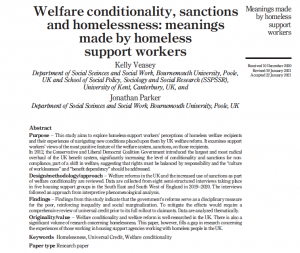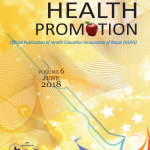It’s my great pleasure to announce our latest paper published with former BU student, Kelly Veasey, now undertaking her master’s in International Social Policy at the University of Kent and working part-time for Citizen’s Advice. It is published, Open Access, in the Journal of Humanities and Applied Social Sciences. (https://www.emerald.com/insight/2632-279X.htm).
The paper ‘Welfare conditionality, sanctions and homelessness: meanings made by homeless support workers’ is of great relevance in these days of continued austerity compounded by the pandemic. Based on Kelly’s undergraduate research, the open access paper explores homeless-support workers’ perceptions of homeless welfare recipients and their experiences of navigating new conditions placed upon them by UK welfare reform. It examines support workers’ views of the most punitive feature of the welfare system, sanctions, on those recipients. In 2012, the Conservative and Liberal Democrat Coalition Government introduced the largest and most radical overhaul of the UK benefit system, significantly increasing the level of conditionality and sanctions for noncompliance, part of a shift in welfare, suggesting that rights must be balanced by responsibility and the “culture of worklessness” and “benefit dependency” should be addressed. We reviewed welfare reforms in the UK and the increased use of sanctions as part of welfare conditionality. Data were collected from eight semi-structured interviews taking place in five housing support groups in the South East and South West of England in 2019–2020. Findings from our study indicate that the government’s reforms serve as a disciplinary measure for the poor, reinforcing inequality and social marginalization. To mitigate the effects would require a comprehensive review of universal credit prior to its full rollout to claimants. While welfare conditionality, welfare reform and homeless are well-researched in the UK, this paper fills a gap in research concerning the experiences of those working in housing support agencies working with homeless people in the UK.
The full text is accessible by following this link DOI 10.1108/JHASS-12-2020-0213.
 Research methods paper published by CMMPH student Preeti Mahato
Research methods paper published by CMMPH student Preeti Mahato Latest FHSS health & migration paper published
Latest FHSS health & migration paper published










 Dr. Ashraf cited on ‘Modest Fashion’ in The Guardian
Dr. Ashraf cited on ‘Modest Fashion’ in The Guardian NIHR-funded research launches website
NIHR-funded research launches website Academics write for newspaper in Nepal
Academics write for newspaper in Nepal New paper published on disability in women & girls
New paper published on disability in women & girls MSCA Postdoctoral Fellowships 2025 Call
MSCA Postdoctoral Fellowships 2025 Call ERC Advanced Grant 2025 Webinar
ERC Advanced Grant 2025 Webinar Horizon Europe Work Programme 2025 Published
Horizon Europe Work Programme 2025 Published Horizon Europe 2025 Work Programme pre-Published
Horizon Europe 2025 Work Programme pre-Published Update on UKRO services
Update on UKRO services European research project exploring use of ‘virtual twins’ to better manage metabolic associated fatty liver disease
European research project exploring use of ‘virtual twins’ to better manage metabolic associated fatty liver disease